Finland is the happiest country in the world (2023 World Happiness Report), and no wonder: when the indicators are such as wealth, welfare and freedom, Nordic welfare states rank at the top of the list. The following reading and listening tips examine happiness from different perspectives.
For more reading tips on happiness, see HAMK Finna main page.
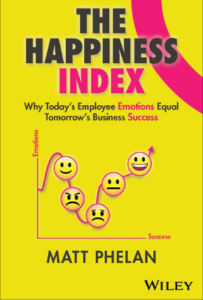 Phelan, M. (2023). Happiness index: Why today’s emotions equal tomorrow’s business success. Wiley-Blackwell.
Phelan, M. (2023). Happiness index: Why today’s emotions equal tomorrow’s business success. Wiley-Blackwell.
Phelan has used the data of the World Happiness Index to explore how businesses can ensure their staff is committed to the organizational goals. According to him, both their brains and hearts need to thrive. He uses case studies and specialist interviews to deepen the data and give practical lessons that can be used in strategy work.
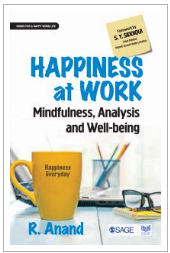 Anand, R. (2018). Happiness at Work: Mindfulness, Analysis and Well-being. Sage.
Anand, R. (2018). Happiness at Work: Mindfulness, Analysis and Well-being. Sage.
Work takes up most of our waking life, so it only makes sense to find happiness doing it. Anand approaches happiness through creativity and productivity, discussing stress and distortions in thinking that affect both moods and worldview. He aims to help us understand these distortions, so that we can begin to correct them.
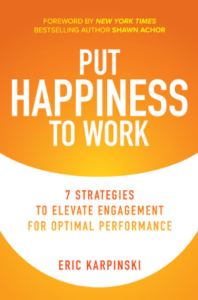 Karpinski, E. (2021). Put Happiness to Work: 7 Strategies to Elevate Engagement for Optimal Performance. McGraw-Hill.
Karpinski, E. (2021). Put Happiness to Work: 7 Strategies to Elevate Engagement for Optimal Performance. McGraw-Hill.
Karpinski uses happiness as a tool, introducing seven strategies to motivate employees for certain types of happiness. At the same time, both employee engagement and organizational performance improve. Engaged teams, appreciation, caring leadership, coaching, and stress as a positive force are all discussed.
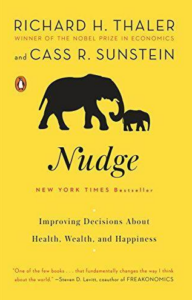 Thaler, R. H. & Sunstein, C. R. (2014). Nudge: Improving Decisions About Health, Wealth, and Happiness. Hachette Audiobook.
Thaler, R. H. & Sunstein, C. R. (2014). Nudge: Improving Decisions About Health, Wealth, and Happiness. Hachette Audiobook.
This is the book that popularized nudge theory, the idea that people’s choices can be influenced by slight changes in their decision environment. They introduce two systems of human thinking: one is the reflective and sensible on, the other automatic, or instinctive and rapid. Often the two systems are in conflict, which opens the door to influence decisions through choice architecture.
Also available as a paperback.
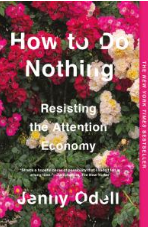 Odell, J. (2019). How to do nothing: Resisting the attention economy. Melville House.
Odell, J. (2019). How to do nothing: Resisting the attention economy. Melville House.
Finally, I would like to draw attention to this little gem. In today’s attention economy, rather than preaching technological abstinence, Odell suggests we should redirect our attention. According to her, we should take back control from algorithms and make thoughtful choices according to our own wants and desires. We should take better care of how we connect, and what we use that connection to do.
Thank you for the photo: StockSnap@Pixabay



